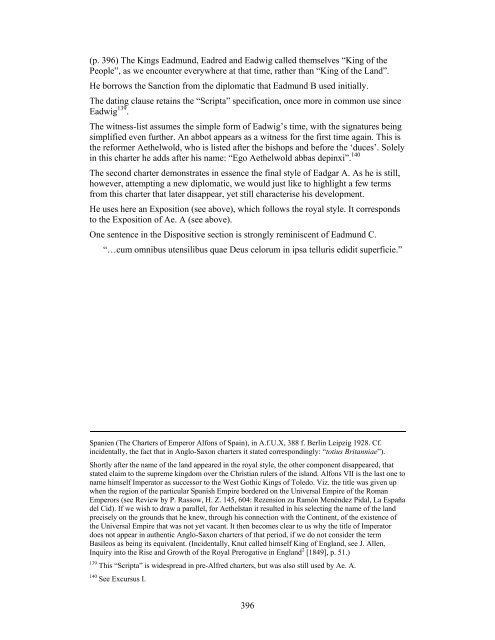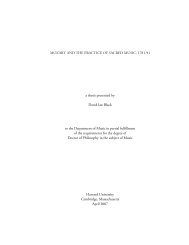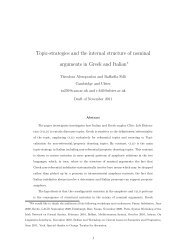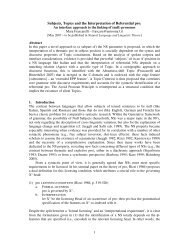Provisional Drogereit pdf
Provisional Drogereit pdf
Provisional Drogereit pdf
Create successful ePaper yourself
Turn your PDF publications into a flip-book with our unique Google optimized e-Paper software.
(p. 396) The Kings Eadmund, Eadred and Eadwig called themselves “King of the<br />
People”, as we encounter everywhere at that time, rather than “King of the Land”.<br />
He borrows the Sanction from the diplomatic that Eadmund B used initially.<br />
The dating clause retains the “Scripta” specification, once more in common use since<br />
Eadwig 139 .<br />
The witness-list assumes the simple form of Eadwig’s time, with the signatures being<br />
simplified even further. An abbot appears as a witness for the first time again. This is<br />
the reformer Aethelwold, who is listed after the bishops and before the ‘duces’. Solely<br />
in this charter he adds after his name: “Ego Aethelwold abbas depinxi”. 140<br />
The second charter demonstrates in essence the final style of Eadgar A. As he is still,<br />
however, attempting a new diplomatic, we would just like to highlight a few terms<br />
from this charter that later disappear, yet still characterise his development.<br />
He uses here an Exposition (see above), which follows the royal style. It corresponds<br />
to the Exposition of Ae. A (see above).<br />
One sentence in the Dispositive section is strongly reminiscent of Eadmund C.<br />
“…cum omnibus utensilibus quae Deus celorum in ipsa telluris edidit superficie.”<br />
Spanien (The Charters of Emperor Alfons of Spain), in A.f.U.X, 388 f. Berlin Leipzig 1928. Cf.<br />
incidentally, the fact that in Anglo-Saxon charters it stated correspondingly: “totius Britanniae”).<br />
Shortly after the name of the land appeared in the royal style, the other component disappeared, that<br />
stated claim to the supreme kingdom over the Christian rulers of the island. Alfons VII is the last one to<br />
name himself Imperator as successor to the West Gothic Kings of Toledo. Viz. the title was given up<br />
when the region of the particular Spanish Empire bordered on the Universal Empire of the Roman<br />
Emperors (see Review by P. Rassow, H. Z. 145, 604: Rezension zu Ramón Menéndez Pidal, La España<br />
del Cid). If we wish to draw a parallel, for Aethelstan it resulted in his selecting the name of the land<br />
precisely on the grounds that he knew, through his connection with the Continent, of the existence of<br />
the Universal Empire that was not yet vacant. It then becomes clear to us why the title of Imperator<br />
does not appear in authentic Anglo-Saxon charters of that period, if we do not consider the term<br />
Basileos as being its equivalent. (Incidentally, Knut called himself King of England, see J. Allen,<br />
Inquiry into the Rise and Growth of the Royal Prerogative in England 2 [1849], p. 51.)<br />
139 This “Scripta” is widespread in pre-Alfred charters, but was also still used by Ae. A.<br />
140 See Excursus I.<br />
396
















